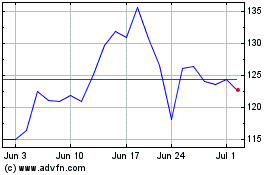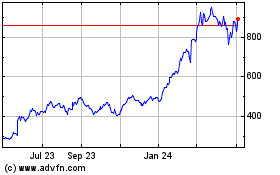U.S. Stocks Extend Slump as Pressure Intensifies on Tech
November 20 2018 - 10:04AM
Dow Jones News
By David Hodari
U.S. stocks opened lower Tuesday, extending the latest wave of
selling as pressure intensified on the global technology
sector.
The Dow Jones Industrial Average fell 440 points, or 1.7%, to
24582 shortly after the opening bell. The S&P 500 dropped 1.1%
and the Nasdaq Composite declined 2.2%. The Nasdaq slumped 3%
Monday, closing near a seven-month low, with tech-giant Alphabet
slipping into bear-market territory.
In Europe, the pan-continental Stoxx Europe 600 index fell 0.8%
in early afternoon trading, with the index's tech sector leading
the way down, descending 2.5% to its lowest level in 18 months.
Selling in the European auto sector echoed similar losses in
Asia. Renault shares dropped 2.6% after Mitsubishi Motors and
Nissan slipped 6.9% and 5.5% respectively, following the arrest of
Nissan Chairman Carlos Ghosn. Nissan, which has a strategic
partnership with both Mitsubishi and Renault, said Monday that it
intended to oust Mr. Ghosn after an internal probe concluded he had
under reported his pay. On Tuesday, France said it was asking
Renault to look for interim leadership while Mr. Ghosn is under
arrest.
Falling automotive stocks combined with the pressure on
Asia-Pacific technology equities to send share prices across the
region tumbling.
Japan's Nikkei index was down 1.1%, while the Shanghai Composite
Index and Hong Kong's Hang Seng both fell around 2%. The tech-heavy
Shenzhen A-Share dropped 2.7%.
Lower-than-expected demand for Apple's new iPhones and the
company's expansion of its product offerings have put a strain on
its supply chain, making it harder for the company to forecast the
number of necessary components.
Shares in screen manufacturer Japan Display -- one of the Apple
suppliers to have recently cut its quarterly profit estimates --
were down 10.3% Tuesday.
Adding to the downbeat mood in the tech sector, Chinese
officials said they had found widespread evidence of
anticompetitive behavior. Beijing investigators cited a
price-fixing probe into South Korean firms Samsung Electronics,
down 2%, and SK Hynix, down 3.3%. U.S.-based Micron Technology was
also implicated in the reports, and its shares fell 5.5% in
premarket trade.
Despite those developments, computer hardware firms have still
outperformed the broader tech sector so far this year. The S&P
500 technology hardware and equipment basket has climbed 8.7% in
2018, versus 3.8% for the index's broader tech sector.
A combination of soft earnings forecasts from sector giants like
Apple and Facebook, anxieties that corporate earnings may have
peaked and frosty trading relations between the U.S. and China have
left tech stocks vulnerable to selling, surprising investors.
"The tech sector, especially in the U.S. is more exposed to
political and regulatory risk than a lot of investors were prepared
for," said Jared Woodard, global investment strategist at Bank of
America Merrill Lynch.
With the November BAML Fund Managers survey revealing the
largest drop in allocation to tech in October since the financial
crisis, investors were eyeing the prospective meeting between
President Trump and China's President Xi, expected at the Group of
20 summit in Buenos Aires later in November, for any signs that a
trade deal might be negotiated.
"The trade conflict is a tech arms race and something not likely
to be resolved in any major way in the near term. We suggest more
pain for financial markets is likely possible for consumers before
either party makes concessions," Mr. Woodard said.
The course of global economic growth and political risk during
the first months of 2019 could also determine whether Chinese
giants like Baidu, Alibaba Group and Tencent Holdings take an even
bigger hit next year, say strategists.
"Big Chinese tech companies haven't been generating the amount
of revenue they were previously. They've been loading up on debt
instead and that plays into other areas of credit concern for
China," said Frances Hudson, a global strategist at Aberdeen
Standard Investments. "It could come back to bite them depending on
how the world moves next year."
Aside from ongoing trade tensions between the world's two
largest economies, market participants were also watching Brexit
negotiations between U.K. and European Union lawmakers. U.K. Prime
Minister Theresa May continued to fight to save the deal she
negotiated with the EU while also defending her grip on power
against a potential confidence vote by fellow members of
Parliament.
In commodities, the price of Brent crude oil fell 0.8% to $66.26
a barrel -- extending its month losses to more than 17% -- while
gold was up 0.1% at $1,226.70 a troy ounce.
In cryptocurrency markets, bitcoin plunged 16% to $4,395.46
according to CoinDesk, its lowest price since October 2017.
Write to David Hodari at David.Hodari@dowjones.com
(END) Dow Jones Newswires
November 20, 2018 09:49 ET (14:49 GMT)
Copyright (c) 2018 Dow Jones & Company, Inc.
NVIDIA (NASDAQ:NVDA)
Historical Stock Chart
From Mar 2024 to Apr 2024

NVIDIA (NASDAQ:NVDA)
Historical Stock Chart
From Apr 2023 to Apr 2024
